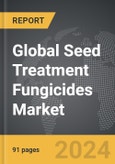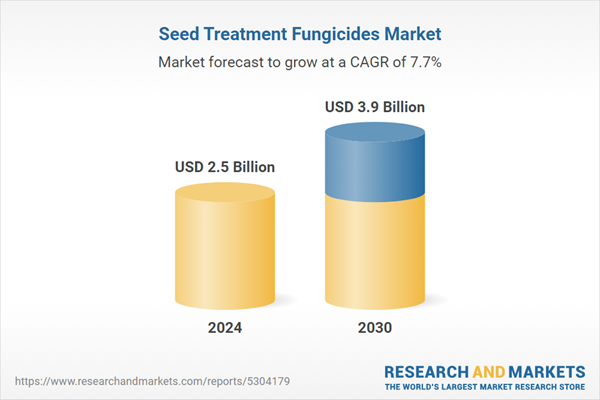Global Seed Treatment Fungicides Market - Key Trends and Drivers Summarized
How Are Seed Treatment Fungicides Enhancing Crop Protection?
Seed treatment fungicides are specialized chemical or biological agents applied to seeds before planting to protect them from fungal diseases during germination and early growth stages. These fungicides form a protective barrier around the seed, safeguarding it from pathogens present in the soil and promoting healthier crop establishment. Widely used in crops such as cereals, oilseeds, and vegetables, seed treatment fungicides help increase yield, improve crop quality, and reduce the need for extensive in-field fungicide applications. As the demand for higher agricultural productivity and sustainable farming practices grows, seed treatment fungicides have become an essential component of integrated pest management (IPM) strategies.What Are the Key Segments in the Seed Treatment Fungicides Market?
Major types include chemical fungicides, such as azoxystrobin and metalaxyl, and biological fungicides, including microbial-based treatments. Chemical fungicides hold the largest market share due to their proven efficacy against a broad spectrum of fungal diseases. In terms of crop type, cereals and grains account for a significant share of the market, driven by the extensive use of fungicides in wheat, corn, and rice cultivation. Formulation types include dry powder, liquid, and ready-to-use seed coatings, with liquid formulations leading the market due to their ease of application and uniform coverage.How Are Seed Treatment Fungicides Being Integrated Across Crop Cultivation?
In cereal cultivation, seed treatment fungicides are used to protect crops like wheat, corn, and barley from common fungal diseases such as smut, rust, and seed rot, ensuring healthy crop establishment and maximizing yield. Oilseed crops like soybean and canola also benefit from fungicide-treated seeds, which enhance germination rates and protect against diseases like Phytophthora and Fusarium wilt. In the vegetable sector, seed treatment fungicides are widely used in crops like tomatoes, cucumbers, and lettuce, preventing soil-borne diseases that can affect seedling growth. Additionally, seed treatment fungicides are increasingly used in sustainable agriculture, as they reduce the need for multiple in-field fungicide applications, supporting both environmental and economic goals.What Factors Are Driving the Growth in the Seed Treatment Fungicides Market?
The growth in the Seed Treatment Fungicides market is driven by several factors, including the increasing need for higher agricultural productivity to meet global food demand. The rising incidence of seed-borne and soil-borne fungal diseases has further fueled the adoption of seed treatment fungicides, as they provide effective early-stage protection. Advancements in fungicide formulations, such as the development of systemic and multi-mode fungicides, have improved disease control and broadened the range of protected crops, supporting wider adoption. The focus on sustainable agriculture and integrated pest management has also boosted demand, as seed treatment fungicides reduce chemical inputs in the field. Additionally, government initiatives promoting improved seed quality and agricultural yields are contributing to market growth.Report Scope
The report analyzes the Seed Treatment Fungicides market, presented in terms of market value (US$ Thousand). The analysis covers the key segments and geographic regions outlined below.- Segments: Type (Chemical, Biological); Crop Type (Cereals & Grains, Oilseeds & Pulses, Other Crop Types); Form (Liquid, Powder).
- Geographic Regions/Countries:World; United States; Canada; Japan; China; Europe (France; Germany; Italy; United Kingdom; and Rest of Europe); Asia-Pacific; Rest of World.
Key Insights:
- Market Growth: Understand the significant growth trajectory of the Chemical Fungicides segment, which is expected to reach US$2.5 Billion by 2030 with a CAGR of a 7.1%. The Biological Fungicides segment is also set to grow at 8.8% CAGR over the analysis period.
- Regional Analysis: Gain insights into the U.S. market, valued at $703.8 Million in 2024, and China, forecasted to grow at an impressive 7.2% CAGR to reach $608.8 Million by 2030. Discover growth trends in other key regions, including Japan, Canada, Germany, and the Asia-Pacific.
Why You Should Buy This Report:
- Detailed Market Analysis: Access a thorough analysis of the Global Seed Treatment Fungicides Market, covering all major geographic regions and market segments.
- Competitive Insights: Get an overview of the competitive landscape, including the market presence of major players across different geographies.
- Future Trends and Drivers: Understand the key trends and drivers shaping the future of the Global Seed Treatment Fungicides Market.
- Actionable Insights: Benefit from actionable insights that can help you identify new revenue opportunities and make strategic business decisions.
Key Questions Answered:
- How is the Global Seed Treatment Fungicides Market expected to evolve by 2030?
- What are the main drivers and restraints affecting the market?
- Which market segments will grow the most over the forecast period?
- How will market shares for different regions and segments change by 2030?
- Who are the leading players in the market, and what are their prospects?
Report Features:
- Comprehensive Market Data: Independent analysis of annual sales and market forecasts in US$ Million from 2024 to 2030.
- In-Depth Regional Analysis: Detailed insights into key markets, including the U.S., China, Japan, Canada, Europe, Asia-Pacific, Latin America, Middle East, and Africa.
- Company Profiles: Coverage of players such as Adama Agricultural Solutions, Arysta Lifescience, Auswest Seeds, BASF, Bayer Cropscience and more.
- Complimentary Updates: Receive free report updates for one year to keep you informed of the latest market developments.
Some of the 38 companies featured in this Seed Treatment Fungicides market report include:
- Adama Agricultural Solutions
- Arysta Lifescience
- Auswest Seeds
- BASF
- Bayer Cropscience
- Dow Chemical Company
- DuPont
- FMC Corporation
- Germains Seed Technology
- Helena Chemical Company
- Loveland Products
- Monsanto Company
- Novozymes
- Nufarm
- Platform Specialty Products
- Rallis India Limited
- Rotam
- Sumitomo Chemical Company
- Syngenta
- Tagros Chemicals
- UPL
- Wilbur-ellis Holdings
This edition integrates the latest global trade and economic shifts into comprehensive market analysis. Key updates include:
- Tariff and Trade Impact: Insights into global tariff negotiations across 180+ countries, with analysis of supply chain turbulence, sourcing disruptions, and geographic realignment. Special focus on 2025 as a pivotal year for trade tensions, including updated perspectives on the Trump-era tariffs.
- Adjusted Forecasts and Analytics: Revised global and regional market forecasts through 2030, incorporating tariff effects, economic uncertainty, and structural changes in globalization. Includes historical analysis from 2015 to 2023.
- Strategic Market Dynamics: Evaluation of revised market prospects, regional outlooks, and key economic indicators such as population and urbanization trends.
- Innovation & Technology Trends: Latest developments in product and process innovation, emerging technologies, and key industry drivers shaping the competitive landscape.
- Competitive Intelligence: Updated global market share estimates for 2025, competitive positioning of major players (Strong/Active/Niche/Trivial), and refined focus on leading global brands and core players.
- Expert Insight & Commentary: Strategic analysis from economists, trade experts, and domain specialists to contextualize market shifts and identify emerging opportunities.
Table of Contents
Companies Mentioned (Partial List)
A selection of companies mentioned in this report includes, but is not limited to:
- Adama Agricultural Solutions
- Arysta Lifescience
- Auswest Seeds
- BASF
- Bayer Cropscience
- Dow Chemical Company
- DuPont
- FMC Corporation
- Germains Seed Technology
- Helena Chemical Company
- Loveland Products
- Monsanto Company
- Novozymes
- Nufarm
- Platform Specialty Products
- Rallis India Limited
- Rotam
- Sumitomo Chemical Company
- Syngenta
- Tagros Chemicals
- UPL
- Wilbur-ellis Holdings
Table Information
| Report Attribute | Details |
|---|---|
| No. of Pages | 215 |
| Published | February 2026 |
| Forecast Period | 2024 - 2030 |
| Estimated Market Value ( USD | $ 2.5 Billion |
| Forecasted Market Value ( USD | $ 3.9 Billion |
| Compound Annual Growth Rate | 7.7% |
| Regions Covered | Global |









